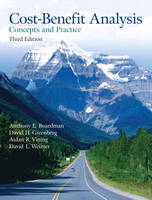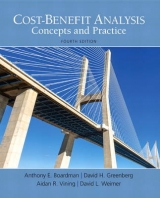
Cost Benefit Analysis
Pearson (Verlag)
978-0-13-143583-4 (ISBN)
- Titel erscheint in neuer Auflage
- Artikel merken
For courses in Cost-Benefit Analysis, taught in Economics Departments, Public Policy Departments, and Public Administration Departments. Also ideal forpracticing policy analysts andpublic managers.
This authoritative, market leading text is distinct for it's consistent application of a nine-step framework for conducting or interpreting a cost-benefit analysis.
Anthony Boardman Anthony E. Boardman is the Van Dusen Professor of Business Administration at the University of British Columbia. His publications on cost-benefit analysis have appeared in many leading academic journals including the Journal of Policy Analysis and Management, Socio-Economic Planning Sciences, Annals of Regional Science, and the Journal of Comparative Policy Analysis Research and Practice. He has also served as a consultant for the Treasury of New Zealand and all levels of government in Canada. David Weimer David L. Weimer is professor of public affairs at the University of Wisconsin-Madison. He has published work involving the application of cost-benefit analysis to energy policy and the use of contingent valuation surveys. He also has contributed entries on cost-benefit analysis to the International Encyclopedia of the Social and Behavioral Sciences and the New Palgrave Dictionary of Economics (2nd edition). Aidan R. Vining Aidan R. Vining is the CNABS Professor of Business and Government Relations in the Faculty of Business Administration, Simon Fraser University in Vancouver, British Columbia (Canada) and holds a Ph.D. from the Goldman Graduate School of Public Policy at the University of California, Berkeley. His articles related to cost-benefit analysis have appeared in a wide range of journals. In addition to authoring these articles, Dr. Vining is the author of Policy Analysis; Concepts and Practice with David Weimer (4th. Edition, Pearson Prentice-Hall, 2005) and has recently co-edited Building the Future: Issues in Public Infrastructure in Canada (C.D. Howe) which analyzes the costs and benefits of major infrastructure projects in Canada. Over the last twenty five years, he has taught numerous courses and seminars on cost-benefit analysis and policy analysis to government analysts in countries around the world David Greenberg David Greenberg is a professor emeritus of economics at the University of Maryland Baltimore County (UMBC). In 2002 he worked as a labor market analyst at the Prime Minister’s Strategy Unit within the British Cabinet Office, helping design a random assignment evaluation of a pilot program that attempts to help retain disadvantaged workers in employment and aid their advancement and is currently working on the cost-benefit analysis of this pilot program. In addition, he is presently responsible for the cost-benefit analyses of two on-going U.K. programs: the New Deal for Disabled Persons and has taught a course in cost-benefit analysis at UMBC for many years.
Part I: Overview
1. Introduction to Cost-Benefit Analysis
2. Conceptual Foundations of Cost-Benefit Analysis
Part II: Fundamentals of Cost-Benefit Analysis
3. Basic Microeconomic Foundations of Cost-Benefit Analysis
4. Valuing Benefits and Costs in Primary Markets
5. Valuing Benefits and Costs in Secondary Markets
6. Discounting Benefits and Costs in Future Time Periods
7. Dealing with Uncertainty: Expected Value, Sensitivity Analysis, and the Value of Information
8. Option Price and Option Value
9. Existence Value
10. The Social Discount Rate
Part III: Valuation of Impacts
11. Valuing Impacts from Observed Behavior: Demonstrations
12. Valuing Impacts from Observed Behavior: Direct Estimation of Demand Curves
13. Valuing Impacts from Observed Behavior: Other Revealed Preference Methods
14. Contingent Valuation: Using Surveys to Elicit Information About Costs and Benefits
15. Shadow Prices from Secondary Sources
16. Shadow Prices: Applications to Developing Countries
Part IV: Related Methods and Accuracy
17. Cost-Effectiveness Analysis
18. Distributionally Weighted Cost-Benefit Analysis
19. How Accurate is CBA?
A Selected Cost-Benefit Analysis Bibliography
Name Index
Subject Index
| Erscheint lt. Verlag | 19.1.2006 |
|---|---|
| Sprache | englisch |
| Maße | 196 x 241 mm |
| Gewicht | 1052 g |
| Themenwelt | Wirtschaft ► Betriebswirtschaft / Management ► Controlling / Kostenrechnung |
| Wirtschaft ► Volkswirtschaftslehre | |
| ISBN-10 | 0-13-143583-3 / 0131435833 |
| ISBN-13 | 978-0-13-143583-4 / 9780131435834 |
| Zustand | Neuware |
| Haben Sie eine Frage zum Produkt? |
aus dem Bereich



